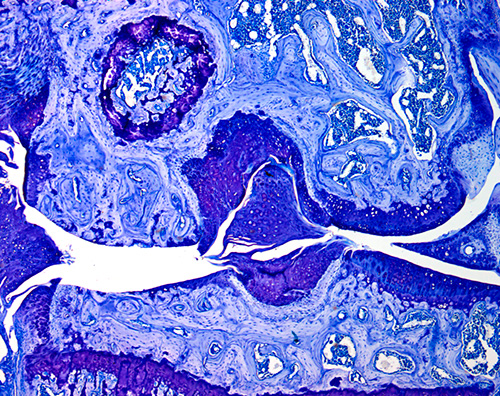Blandine Poulet
Current Position: Tenure Track fellow / Arthritis Research UK Career Development Research fellow; University of Liverpool, Institute of ageing and Chronic Diseases
First Degree
My first degree was at the RVC on the BSc course in Veterinary Sciences. During this time I gained an insight into research, in particular the extensive lab-based projects were very useful to choose and start my PhD studies. In the second year, we had a 6 weeks project in the lab, which I did in Andy Pitsillides' group working on chondrocytes, and my third year 3-months lab project was with Simon Bailey working on the effects of hypoxia on equine digital vein and artery smooth muscle cells. Both projects added to my desire to pursue a research career. It was also after my time in the Pitsillides' group that decided to do a PhD in that lab, and that was probably one of the best decisions I made!
Current Position
After my PhD at the RVC, I went on to do a one-year postdoc in the same lab; followed by an ARUK Foundation Fellowship at UCL for 3 years, then an ARUK Career Development Fellowship for 5 years, which I am currently in the middle of. During that time I moved to Liverpool on a Tenure track position to set up my own lab (with 1 postdoc and 1 PhD student, and undergrads/masters students). I have been awarded various grants as PI and co-PI.
I have the following experience that might be of interest: experience of being a research fellow and getting on the road to independence and what it takes to set up your own lab.
At what point did you decide to apply for the fellowship and how did you find the actual application process?
I decided to apply for a fellowship in the final year of my PhD. The application was tough but once I had a clear idea of what research I wanted to do, it was all about writing skills. The process was very interesting and an eye-opener into the grant-writing world, which is very different to paper and thesis writing, and will be very beneficial for future grant applications.
What made you decide to apply for the fellowship?
I decided to apply for a fellowship because I knew the area of research I wanted to work in for my career and I was very keen on developing this on my own. With the help of my supervisor, Prof Andrew Pitsillides, I decided on a specific project which will help me become an independent researcher. In addition, I was aware that the fellowship route was the best approach to work towards getting an offer for an academic position in the UK.
How easy did you find getting your fellowship?
It was difficult, as it should be. The hard bit is finding your research niche, the area of research you want to work in without interfering with other people’s research, and finding the specific project that is right for the type of fellowship you are applying for; I personally went through many ideas and with the help of my mentors I chose to look at the effects of FSTL3 deletion on osteoarthritis development in mice. This project allowed me to investigate new methods and processes, which is an important part of any fellowship. Another point I was uncertain about before was the need for the College and associated establishments to go through the costings of your application: I didn't know I was meant to do any of that!

Do you have any tips from the application process?
- Make sure you have the right mentors to help you with the application and once you have been awarded the fellowship. Their help and guidance is in my opinion necessary for your success.
- Find a project that is your own, and not your sponsors.
- Take all the time you need to get the ideas, hypothesis and aims right: I started thinking about it a year before writing the fellowship; it then takes 2-3 months to get it ready for submission.
- Remember that all costings have to go through the college, and that also takes time. Do not leave it to the last minute!
- Finally, do it because you want to, not because someone else tells you that you should.
How has your time at the RVC helped develop your career?
I was a postdoc for one year before starting my fellowship with Professor Andrew Pitsillides. The RVC supported me and provided me with all the tools I needed for my career; including great mentorship both scientifically and for my career development, willing collaborators within the RVC, availability of courses and mentors to discuss new techniques and career development (writing grants and papers, interviews), teaching (by teaching and supervising many undergraduate students, as well as tutorials).
During my time at the RVC I applied for and was awarded the Arthritis Research UK Foundation fellowship which was supported by many people at the RVC (even though it was not an RVC-based grant). Helpfulness from RVC staff has guided me every step of the way to become an independent researcher and to perform high standard research.
I have also published two first author papers:
- Poulet B, Hamilton RW, Shefelbine S, Pitsillides AA (2011). Characterizing a novel and adjustable non-invasive murine knee joint loading model. Arthritis and Rheumatism; 63 (1): 137-147. dx.doi.org/10.1002/art.27765
- Poulet B, Ulici V, Stone TC, Pead M, Gburcik V, Constantinou E, Palmer DB, Beier F, Timmons JA, Pitsillides AA. Time-series transcriptional profiling yields new perspectives on susceptibility to osteoarthritis. Arthritis and Rheumatism: under review dx.doi.org/10.1002/art.34572
Interesting pointers that you wish you had known when you were starting out as a post doc
That more is expected of postdocs, as you are given greater independence in setting up experiments, writing papers and managing the lab (although all of these were also true for a Phd).
Blandine Poulet, February 2012
